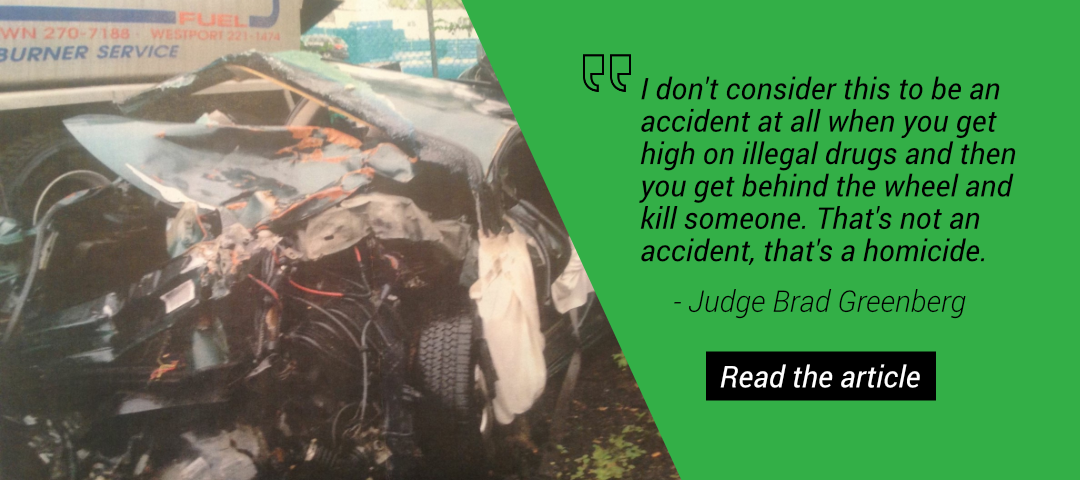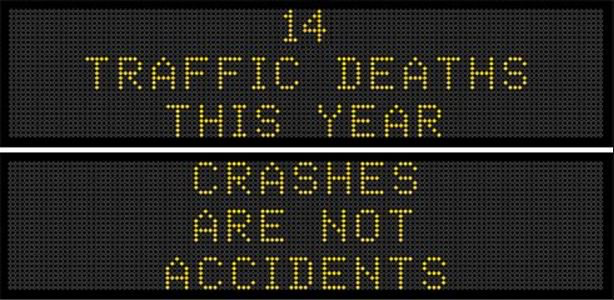PETITION - Crash vs. Accident
We, the victims, survivors and their supporters who have been impacted by motor vehicle crashes and crimes urge the public and the media to stop using the word accident. We ask the media to change their policies and follow the AP Stylebook Guidelines:
- "When negligence is claimed or proven, avoid accident, which can be read as exonerating the person responsible. Instead, use crash, collision or other terms."
Drunk, drugged, distracted and most other crashes are caused by either dangerous or criminal behaviors.
We urge everyone to sign this petition and pass it on for others to sign. By standing in solidarity with those directly affected by the inaccurate and painful use of the word accident, we can stop excusing irresponsible and dangerous driving choices.
Thank you!

Watch Drop the "A" Word Video Here.
Read full press release about the Drop the “A" Word Campaign here.
Matthew Beard was only twenty-one years old when he was struck by a drunk driver on December 21, 2006. An avid scuba diver and student at Florida State University, Matthew had dreams of one day becoming a marine biologist. Unfortunately, these dreams were stolen from him, as he died from his injuries just four days after Christmas.
While the media were quick to label this tragedy an “accident,” Matthew’s mother, Connie Russell, knew that it was anything but:
“Matthew didn’t have to die.”
Wrong by Definition
Accident: An unexpected happening causing loss or injury which is not due to any fault or misconduct on the part of the person injured but for which legal relief may be sought.
All too often, crashes resulting from drunk, drugged, and distracted driving are referred to as “accidents.” This is incorrect, in spite of the common misconception that if a person doesn’t intend for something bad to happen, then it’s an accident. However, the definition of the “A” word makes no mention of intent—only misconduct.
And when it comes to misconduct, there is perhaps none so dangerous as getting behind the wheel of a car drunk, drugged, or distracted.
Drop The “A” Word
The Drop The “A” Word campaign is made up of a diverse group of highway safety advocates and organizations, victims groups, media, law enforcement, and others united in an effort to discontinue the improper and dangerous use of the word “accident” when referring to roadway incidents.
 Why is the “A” word so dangerous in this context? First off, the connotation of the word is that there is no fault—and this simply isn’t the case. While there are some faultless crashes, the fact is that roughly 93% of crashes result from human error. When we automatically refer to all incidents as “accidents,” it implies that they are faultless before investigation has even been completed. The result is that many drivers who are at fault are treated as if they are not.
Why is the “A” word so dangerous in this context? First off, the connotation of the word is that there is no fault—and this simply isn’t the case. While there are some faultless crashes, the fact is that roughly 93% of crashes result from human error. When we automatically refer to all incidents as “accidents,” it implies that they are faultless before investigation has even been completed. The result is that many drivers who are at fault are treated as if they are not.
Accidents are unpredictable. However, drunk, drugged, and distracted drivers are much more likely statistically to be involved in a crash. In other words, they are predictable. Thus, labelling them as accidental is incorrect. For this reason, our goal is to promote the use of terms that more accurately reflect the realities of such occurrences, such as crash, collision, and wreck.
Words Matter
When accident is used:
- It gives an inaccurate impression that there is no fault or liability involved.
- It encourages the perception that crashes are the result of blameless, random occurrences that happen to people who are in the wrong place at the wrong time.
- It fosters the idea that roadway incidents are an acceptable fact of life.
- It reinforces our societal permissiveness towards dangerous driving behaviors that often result in injuries and deaths.
When you use crash, collision, or wreck:
- It shows the occurrence was preventable. After all, people don’t accidentally drink and drive, for example.
- It encourages an evidence-based approach and serves as a reminder that these occurrences are not blameless or random.
- It reminds us that such occurrences are the result of choice and
- It encourages the idea that roadway incidents need not be an acceptable fact of life.
Drunk, drugged, and distracted driving crashes are not accidents, so let’s Drop The “A” Word.
Word Choice Matters: Crash vs. Accident is a thought-provoking article by a former Traffic Safety Resource Prosecutor that examines the difference between a crash and an accident.
Examples of Incorrect Word Choice in the Media
- ABC 7 News
- KYW Newsradio - Philadelphia
- Waycross Journal-Herald
- WZZM 13 - Grand Rapids, MI
- Good Morning America
- CBS Evening News
- New York Times
- Orlando Sentinel
- CBS Evening News
- Des Moines Register
Examples of Correct Word Choice

Get Involved
There are many things you can do to help with the Drop The “A” Word campaign.
- Whenever you see the media refer to a drunk, drugged, or distracted driving incident as an “accident,” contact them and ask them to change it to “crime” or “crash.”
- Whenever you hear somebody call such incidents “accidents,” explain to them why this is not accurate.
- When you see a news story that incorrectly uses “accident,” share it on social media with the caption “Drunk, drugged, and distracted driving crashes are not accidents” and the hashtag #droptheaword.
- Like us on Facebook and follow us on Twitter for updates about Drop The “A” Word.
Together, we can change they way we think and speak about drunk, drugged, and distracted driving and save lives.
Related Articles
Drop the “A” Word – Sign the Petition!
Disregarding a risk does not equal an accident
Don’t Call a Car Crash an ‘Accident’
AP Style Guide Favors ‘Crash’ Over ‘Accident’ (Sometimes)
How Language Helps Erase the Tragedy of Millions of Road Deaths
Minnesota Department of Public Safety: Crashes aren’t accidents
